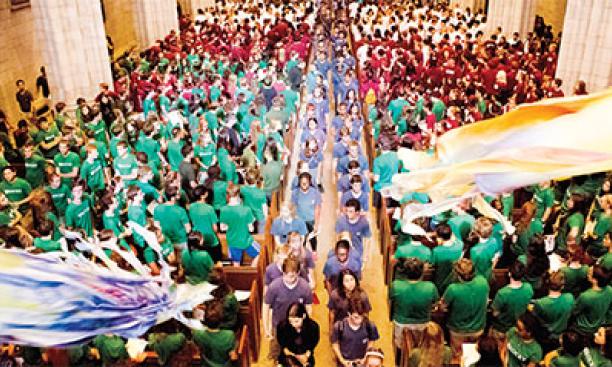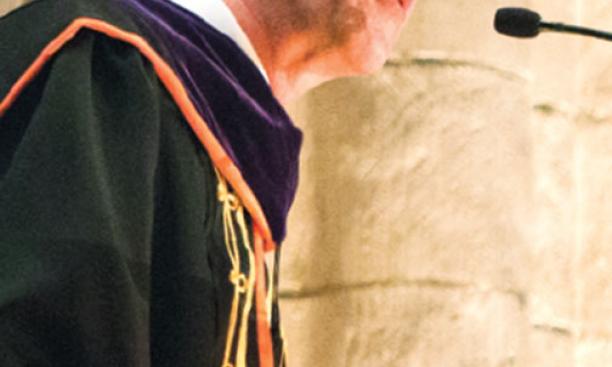

The beginning of a new academic year is always an exciting time at Princeton. The campus buzzes with fresh energy, high hopes, and dazzling possibilities. I look forward to these Opening Exercises, when I have the privilege of welcoming Princeton’s newest arrivals, people who will add brilliantly to the talent and the range of perspectives on this campus. I confess that I always worry that I will trip over this long academic gown when climbing the narrow stairs to this lectern, but, I have to say, the view from up here is spectacular. You look great—a little hot, maybe, but great!
And, if you are anything like the generations of Princetonians who preceded you, this day is an exciting one for you, too. Most of you, I suspect, have been looking forward to your arrival on this campus for months, if not longer. You share this chapel today with a vast array of new acquaintances and fellow Tigers who will be companions and friends, colleagues and collaborators, teammates and allies, not just for the next few years, but for a lifetime.
Way back in the days of yore, when I came to this campus as a freshman, the students who gathered in this chapel were almost completely unknown to one another. I myself had never set foot on the Princeton campus before orientation week, and I had not met a single member of the student body. Indeed, I did not know the names of any classmates other than the two whom the University had assigned me as roommates.
Oh what a relic am I!
Undoubtedly there Addressing the Class of 2019 at are some among you Opening Exercises who, like me, never visited this campus before showing up this week. But whether you visited or not, I would imagine that nearly all of you in the Class of 2019 have spent the last few months relentlessly texting, Facebooking, Googling, Instagramming, and tweeting at, with, and about one another. You know each other’s names. You have seen each other’s pictures, and you have identified common interests.

And yet still, despite all this new technology and the social networking that it makes possible, we gather you physically, much as Princeton has done for centuries, in this chapel. We could instead put the whole show online! You could watch a video message from me in your dorm room, or the dining hall, or wherever you liked. Production values would be high. Acoustics would be excellent. Seats would be softer and air-conditioning would be—well, let’s just say that there would be air-conditioning.
We gather you here, physically and in person, because community and relationships matter fundamentally to our mission. People often conceive of education as though it were a purely intellectual or utilitarian activity involving nothing more than the transmission of information from one brain to another. That is not how we see it. We believe that learning also requires qualities of character and feeling and judgment: motivation, engagement, initiative, persistence, resilience, curiosity, imagination, and daring. These are aspects not of information or argument but of people, and they are inspired and nurtured by the kinds of relationships that develop on campuses like this one.
Such relationships require close contact. No matter how much time we devote to cerebral pursuits, no matter how much attention we give to the virtual reality of online worlds, human beings never reduce to their intellects or their Facebook pages. We are, all of us, inescapably and undeniably embodied, and our bodies are the locus of joys and pains, dreams and fears, perceptions and vulnerabilities. They can be targets of admiration or prejudice. Our bodies are the source of motives and feelings that can impede learning, and they are the source, too, of motives and feelings that can make learning possible.
So we bring you together this afternoon, like so many generations before you, to begin forming relationships that will be the foundation for your education. Unlike past generations, you begin this process with the singular disadvantage of having interacted extensively through social media. Yes, I did say, “disadvantage.” When my classmates and I arrived here, at least the challenge was clear: we knew that we did not know one another.
You, by contrast, may think that you already know your classmates, when in fact you are just beginning the process of living together and forming human relationships that matter, and of contending with the diversity, at once wonderful and difficult, of the people around you.
We often depict diversity in ways that make it look easy, as though it required nothing more than a good-natured willingness to sit down with people who look different from you. Open any college brochure—including, of course, ours—and you find photographs showing students of different races, religions, ethnicities, and nationalities happily conversing, laughing, eating, and studying together.
I expect that diversity will sometimes feel exactly like it looks in those photographs, and that you will connect almost effortlessly across demographic boundaries that have for too long divided peoples and societies. Sometimes, I hope, negotiating diversity will be genuinely easy. I can promise you, though, that it will sometimes be hard. You will encounter people with views, backgrounds, values, and assumptions different from your own. And in such encounters, as Claude Steele showed in his marvelous book Whistling Vivaldi and again at last night’s Freshman Assembly, people can feel their identities threatened in ways that powerfully “affect [their] thoughts, emotions, actions, and performances.”
There is no simple recipe, no standard set of instructions, for engaging with the diversity of opinions and backgrounds that you will encounter on this campus. You will have to make your own choices about how to interact with the community around you—about when to sympathize, when to argue, when to accommodate, when to confront, and when to walk away. But I can confidently give you one piece of guidance: you should strive to understand and learn from the perspectives and experiences of others around you.
As Provost Steele wisely observes, each of us has “understandings and views of the world [that] are partial, and reflect the circumstances of our particular lives.” His own narrative models beautifully how one can learn from diversity: many of his key insights come from careful listening to those around him.
I do not mean to suggest that you should accept other perspectives uncritically. On the contrary, you will have to figure out for yourself how to respond to views different from your own. But understanding is as much a precondition for thoughtful disagreement as it is for agreement. And understanding other people’s views will enrich your own perspective even when you find yourself unable to accept or endorse their opinions.
Sometimes you will find, perhaps to your surprise, that classmates who seem very different from you share your own experiences. When Provost Steele describes the late-night bull sessions that he arranged for students at the University of Michigan, he emphasizes the discovery not of differences but of similarities. He says that “the talk sessions” were valuable because they “revealed that the stresses of college life” such as “a lower test grade than expected, …[or] an unfriendly interaction with another student … happen to everyone.”
You will also benefit from getting to know your professors. Provost Steele writes movingly of the impact that his doctoral adviser, Tom Ostrom, had on his career. Tom Ostrom did not seem like an obvious mentor for a black graduate student: according to Provost Steele, Professor Ostrom was “calm, serious, and nice, but not that personal,” and he did not have “much knowledge of African American experience.” Tom Ostrom and Claude Steele bonded because the professor took his student’s ideas seriously.
A singular advantage of studying at this University is that you have access to extraordinary scholars who will take your ideas seriously. You can find your Tom Ostrom among them. But to do so, you must talk to them! So approach them after class. Go to office hours. Invite them to lunch.
Doing so will make a difference to your time here. Learning is, as I have said already, about relationships, and the quality of your Princeton education will depend heavily upon the relationships that you form with faculty members, students, alumni, and other members of this community. Those relationships will be one of Princeton’s great gifts to you, and they will shape you and your post-Princeton lives as much as the books you read, the experiments you conduct, and the papers you write. We look forward to what we will learn from you—to the ways that you will amaze, surprise, challenge, and thrill us in the years to come. And so we welcome you warmly, and we will cheer and applaud with unabashed enthusiasm and pride as you march in the Pre-rade a few minutes from now, for you are today, and forever shall be, Princeton’s Great Class of 2019!
Welcome to Princeton!

